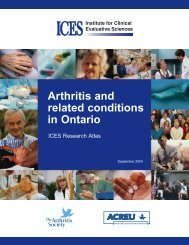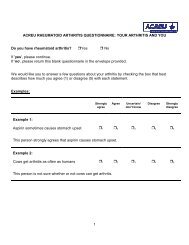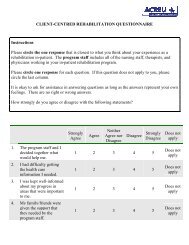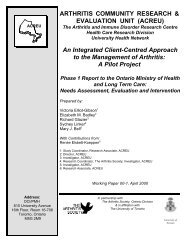Client-Centred Rehabilitation - Arthritis Community Research ...
Client-Centred Rehabilitation - Arthritis Community Research ...
Client-Centred Rehabilitation - Arthritis Community Research ...
Create successful ePaper yourself
Turn your PDF publications into a flip-book with our unique Google optimized e-Paper software.
30<br />
ARTH #2<br />
Preparation for life in the real world<br />
Most participants felt that their rehabilitation<br />
had addressed the physical issues of their<br />
condition and basic care needs well.<br />
However, many felt their rehabilitation had<br />
not prepared them for life in the real world.<br />
In particular they identified a number of<br />
practical community living skills and issues<br />
that they had not felt prepared to address as<br />
well as a number of emotional challenges.<br />
This ill-preparedness was shaped by the age<br />
of the participant and the trajectory of their<br />
condition. Younger clients who experienced<br />
a sudden onset of disability, particularly<br />
those in the ABI and SCI groups,<br />
emphasized issues of reintegration into the<br />
community.<br />
“[rehab hospital] is terribly linked to<br />
the community. They prepare you to<br />
live in the hospital and then<br />
discharge you into a place that<br />
you’ve never been.” SCI #2<br />
In contrast, older clients with chronic<br />
progressive conditions talked about issues of<br />
ill-preparedness with respect to being<br />
adequately prepared to assume all of their<br />
previous activities. They usually had wellestablished<br />
work and family roles and the<br />
issues for them revolved around adjusting to<br />
changes or losses.<br />
“and that’s the only trouble with<br />
rehab and I think that most women<br />
will tell you this…if I just did what<br />
they did in rehab I would be<br />
fine…they don’t wash walls, or do<br />
washing, or do the carpets or all the<br />
things you do at home” COPD #2<br />
These older clients were often struggling<br />
with the loss of their work roles, often<br />
having retired due to illness.<br />
“I mean I lost my career just like<br />
that. Bang! One day you’re traveling<br />
and enjoying life and the next thing<br />
you know bang! You’ve got no<br />
career, no nothing. So it was an<br />
uphill climb to pick up from there.<br />
But I think I managed it quite<br />
successfully.” ARTH #5<br />
In contrast, younger clients were usually<br />
struggling with finding a career. Due to<br />
their age at onset of their condition, they<br />
usually didn’t have established work and<br />
family roles and so needed to develop them.<br />
“They said it wasn’t practical for me<br />
to go back to work because I didn’t<br />
have any practical job skills,<br />
anything that I had to do manually<br />
like that took six times longer than<br />
the average person. It was just like<br />
a stab in the heart. I couldn’t believe<br />
it”. SCI #3<br />
Practical skills for community living<br />
Despite these age-related differences<br />
between some of the conditions, all<br />
participants talked about not feeling that<br />
they had been taught the types of skills that<br />
they would need to live in the community.<br />
Many of these skills went beyond physical<br />
functional tasks to include learning to<br />
manage interpersonal relationships and deal<br />
with the emotional challenges associated<br />
with having a chronic condition.<br />
“The teaching practical<br />
skills....nobody ever takes you to the<br />
Eaton Centre on a Tuesday and says<br />
“We’re going to let you go alone for<br />
3 hours, if you need help of some








